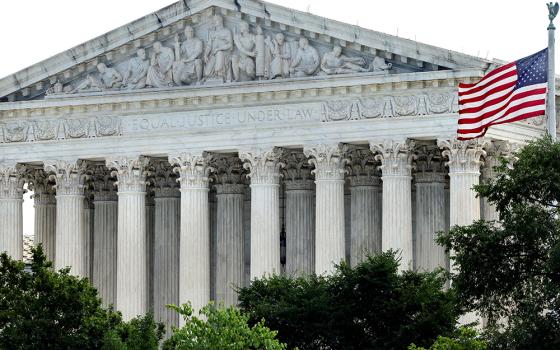The New York Times this morning has a long, and depressing, profile of D.A. King, a former insurance agent in Georgia who quit his job to work full-time fighting immigration reform. Take a moment to read the article because it shows what we who support humane reform are up against as Congress goes home for its August recess.
The deep-seated prejudice of this man seethes through each and every paragraph. He first became alarmed about the issue of immigration when Latinos moved into his neighborhood. They “disrupted the quiet of his leafy street.” I live in a neighborhood that also has a large number of Latino immigrants. It is easy to spot their homes. Theirs are the homes with children’s toys in the yard. Theirs are the homes where, at 6:30 a.m., when I am taking Ambrose for his walk, you see people walking down the steps to get into their cars and drive to work. Actually, there are as many vans as cars because lots of children require more seats. Theirs are the homes from which, on the weekends, you can hear the sounds of a party going on, the music wafting through the neighborhood, the street filling up with cars, more kids, always the kids.
In short, when I walk through my neighborhood, I recognize that it is not as quiet as it might be if it were filled exclusively with middle class white, Anglo-Saxon Protestants. But, instead of bemoaning the fact, I relish it. It is grimly ironic that so many conservatives yearn for a simpler, earlier time, when strong families were the norm, but then they find ways to detest those immigrants who actually have strong families, in which children are the center of the social life of the community, in which an uncle having trouble finding a job or a cousin newly arrived to the States finds a place to sleep and the support to get through the tough times. Isn’t that what has been lost in recent decades? The sense of family, commitment, solidarity. On Saturday afternoons I see a lively culture, not a threatening one, indeed I would fear for America’s future if we did not have so many immigrants. They are the ones who are renewing what is best in American culture.
There is nothing particularly liberal, in the modern sense of the word, about my Latino neighbors. Yes, like most people who come from a Catholic culture, they expect the government to be an active agent for the common good, and they know how bad things are when the government is corrupt, or militarized, or ineffectual. Latinos are not tea partyers. But, modern liberalism has become enamored of the cult of the individual. Look at the disproportionate amount of campaign time spent discussing a woman’s right to choose, or gay people’s right to marry, compared to declining wages and growing income inequality. “The battle for equality on all these fronts [civil rights, feminism and gay rights] has largely been about right, and about fulfilling the enduring elements of the individualist American culture,” writes Gar Alperovitz in his new book “What Then Must We Do?” Whatever your views on affirmative action, same sex marriage or abortion rights, the hyper-individualization of America, aided and abetted by a consumer culture that has every incentive to make you think you are king of the world the second you whip out your credit card, this hyper-individualization that has dominated the concerns of liberals is at the root of what ails our culture. And, it is Latinos with their sense of family and obligation, of solidarity with and compassion for the poor, with their deep faith in a God whose victory promises a Kingdom in which we do not have to fight for justice generation after generation, it is these Latinos who hold out some measure of hope that a more communal, more compassionate culture can yet be born.
Mr. King decries the unwillingness of Latinos to assimilate. “I was taught that we have an American culture to which immigrants will assimilate,” he told the Times. “And I’m incredibly resentful that’s not what’s happening anymore.” Of course, American “culture” is deeply Calvinistic and deeply moralistic and deeply business-minded. De Tocqueville noted these things but even he would be shocked at how each of these cultural traits has become more pronounced in the intervening years. I am sure Mr. King has a story or two about running into a Latino whose English was not up to snuff. We who care about immigration reform must combat his “incredible resentment” not just with policies, but with other stories, stories that highlight the contributions immigrants make to this culture, as they always have, stories about the heart-rending challenges they face and overcome when they arrive.
Last night at the Knights of Columbus Convention, Cardinal Sean O’Malley spoke about his first weeks working at the Centro Hispanico in Washington. A man brought him a letter from his wife accusing him of abandoning her and his family. The many was working two jobs, as a dishwasher. He ate the food left untouched on the dirty plates so he would not have to spend money on food. He walked to work so he would not have to spend money on public transportation. He sent everything he had saved to his wife and family back in his home country. Friar Sean asked the man if he was sending checks or money orders. The man said that he sent cash and deposited it every week in the mailbox just outside the window. He pointed to it. Like a mail box, it had a bright blue top, part of a city beautification effort. It was a trash can. This is what it is like to adjust to a new culture. (And blessings on the Catholic Church for starting centers like the Centro Hispanico to which immigrants can turn as this man turned for help.) I do not know what Mr. King sees in this story. I know that there were gasps in the hotel ballroom last night as the Cardinal told this story. I know that any man who is willing to sacrifice so much for his family is a credit to any country he wants to call home.
This August, Mr. King and his allies are preparing to bombard House Republicans, urging them not to vote for any immigration reform bill that would include a path to legalization, still less citizenship, for the 11 million undocumented immigrants already here, already Americans in by book but already a source of bother – “disturbing the quiet of his leafy street” – and a threat to “American culture” to Mr. King. These opponents of reform are organized. They are angry. They are not interested in appeals to justice. We who wish to see reform passed must, like Cardinal Sean last night, tell the other side of the story, the side that sees hope, not a threat, in our immigrant brothers and sisters, who do not want them to entirely assimilate to our “American culture” because we recognize that our culture needs a healthy dose of what they bring: families that love each other, celebrate with each other, help each other, a faith that is not rooted in the troubled angriness of John Calvin and his angry God, a stance of encounter with the world that welcomes life and love, and keeps judgment at a distance, and does not let the arbiters of consumer culture define what is most significant in life. The immigrants need us but, even more, we need them.





